 Tìm kiếm
Tìm kiếm
Chương 1: Nghị định 209/2013/NĐ-CP hướng dẫn Luật thuế giá trị gia tăng Những quy định chung
| Số hiệu: | 209/2013/NĐ-CP | Loại văn bản: | Nghị định |
| Nơi ban hành: | Chính phủ | Người ký: | Nguyễn Tấn Dũng |
| Ngày ban hành: | 18/12/2013 | Ngày hiệu lực: | 01/01/2014 |
| Ngày công báo: | 01/01/2014 | Số công báo: | Từ số 3 đến số 4 |
| Lĩnh vực: | Thương mại, Thuế - Phí - Lệ Phí | Tình trạng: | Còn hiệu lực |
TÓM TẮT VĂN BẢN
Thêm đối tượng không phải kê khai, nộp thuế GTGT
Ngày 18/12 vừa qua Chính phủ đã ban hành Nghị định 209/2013/NĐ-CP để hướng dẫn một số quy định mới của Luật thuế GTGT sửa đổi.
Theo quy định tại điều 2 Nghị định này sẽ có thêm 2 trường hợp sau không phải kê khai, tính nộp thuế GTGT:
- Tổ chức, cá nhân chuyển nhượng dự án đầu tư để sản xuất, kinh doanh dịch vụ hàng hóa chịu thuế GTGT cho DN, HTX;
- Sản phẩm trồng trọt, chăn nuôi, thủy sản chưa qua chế biến thành các sản phẩm khác hoặc chỉ sơ chế thông thường được bán cho DN, HTX.
Cũng theo Nghị định này, các hoạt động cung cấp hàng hóa dịch vụ ở ngoài Việt Nam sẽ phải thực hiện kê khai, tính nộp thuế GTGT theo quy định (trước đây theo Nghị định 121/2011/NĐ-CP hoạt động này không phải kê khai, nộp thuế).
Nghị định 209 có hiệu lực thi hành từ ngày 01/01/2014.
Văn bản tiếng việt
Văn bản tiếng anh
Nghị định này quy định chi tiết và hướng dẫn thi hành một số điều của Luật thuế giá trị gia tăng và Luật sửa đổi, bổ sung một số điều của Luật thuế giá trị gia tăng về người nộp thuế, đối tượng không chịu thuế, giá tính thuế, thuế suất, phương pháp tính thuế, khấu trừ thuế, hoàn thuế và nơi nộp thuế.
1. Người nộp thuế giá trị gia tăng là tổ chức, cá nhân sản xuất, kinh doanh hàng hóa, dịch vụ chịu thuế giá trị gia tăng (sau đây gọi là cơ sở kinh doanh) và tổ chức, cá nhân nhập khẩu hàng hóa chịu thuế giá trị gia tăng (sau đây gọi là người nhập khẩu).
2. Tổ chức, cá nhân sản xuất, kinh doanh tại Việt Nam mua dịch vụ (kể cả trường hợp mua dịch vụ gắn với hàng hóa) của tổ chức nước ngoài không có cơ sở thường trú tại Việt Nam, cá nhân ở nước ngoài là đối tượng không cư trú tại Việt Nam thì tổ chức, cá nhân mua dịch vụ là người nộp thuế, trừ trường hợp không phải kê khai, tính nộp thuế giá trị gia tăng quy định tại Điểm b Khoản 3 Điều này.
Quy định về cơ sở thường trú và cá nhân ở nước ngoài là đối tượng không cư trú tại Khoản này thực hiện theo quy định của pháp luật thuế thu nhập doanh nghiệp và pháp luật thuế thu nhập cá nhân.
3. Các trường hợp không phải kê khai, tính nộp thuế giá trị gia tăng:
a) Tổ chức, cá nhân nhận các khoản thu về bồi thường, tiền thưởng, tiền hỗ trợ, tiền chuyển nhượng quyền phát thải và các khoản thu tài chính khác.
b) Tổ chức, cá nhân sản xuất, kinh doanh tại Việt Nam mua dịch vụ của tổ chức nước ngoài không có cơ sở thường trú tại Việt Nam, cá nhân ở nước ngoài là đối tượng không cư trú tại Việt Nam, bao gồm các trường hợp: Sửa chữa phương tiện vận tải, máy móc, thiết bị (bao gồm cả vật tư, phụ tùng thay thế); quảng cáo, tiếp thị; xúc tiến đầu tư và thương mại; môi giới bán hàng hóa, cung cấp dịch vụ; đào tạo; chia cước dịch vụ bưu chính, viễn thông quốc tế giữa Việt Nam với nước ngoài mà các dịch vụ này được thực hiện ở ngoài Việt Nam.
c) Tổ chức, cá nhân không kinh doanh, không phải là người nộp thuế giá trị gia tăng bán tài sản.
d) Tổ chức, cá nhân chuyển nhượng dự án đầu tư để sản xuất, kinh doanh hàng hóa, dịch vụ chịu thuế giá trị gia tăng cho doanh nghiệp, hợp tác xã.
đ) Sản phẩm trồng trọt, chăn nuôi, thủy sản chưa chế biến thành các sản phẩm khác hoặc chỉ qua sơ chế thông thường được bán cho doanh nghiệp, hợp tác xã, trừ trường hợp quy định tại Khoản 1 Điều 5 Luật thuế giá trị gia tăng.
Bộ Tài chính hướng dẫn cụ thể quy định tại các Khoản 2 và 3 Điều này.
Đối tượng không chịu thuế giá trị gia tăng thực hiện theo quy định tại Điều 5 Luật thuế giá trị gia tăng và Khoản 1 Điều 1 Luật sửa đổi, bổ sung một số điều của Luật thuế giá trị gia tăng.
1. Đối với các sản phẩm quy định tại Khoản 1 Điều 5 Luật thuế giá trị gia tăng qua sơ chế thông thường là sản phẩm mới được làm sạch, phơi, sấy khô, bóc vỏ, tách hạt, cắt, ướp muối, bảo quản lạnh và các hình thức bảo quản thông thường khác.
2. Một số dịch vụ quy định tại Khoản 8 Điều 5 Luật thuế giá trị gia tăng và Khoản 1 Điều 1 Luật sửa đổi, bổ sung một số điều của Luật thuế giá trị gia tăng được quy định như sau:
a) Dịch vụ cấp tín dụng gồm các hình thức:
- Cho vay;
- Chiết khấu, tái chiết khấu công cụ chuyển nhượng và các giấy tờ có giá khác;
- Bảo lãnh;
- Cho thuê tài chính;
- Phát hành thẻ tín dụng;
- Bao thanh toán trong nước; bao thanh toán quốc tế;
- Bán tài sản bảo đảm tiền vay;
- Cung cấp thông tin tín dụng theo quy định của Luật ngân hàng nhà nước;
- Hình thức cấp tín dụng khác theo quy định của pháp luật.
b) Dịch vụ cho vay của người nộp thuế không phải là tổ chức tín dụng;
c) Kinh doanh chứng khoán bao gồm: Môi giới chứng khoán, tự doanh chứng khoán, bảo lãnh phát hành chứng khoán, tư vấn đầu tư chứng khoán, lưu ký chứng khoán, quản lý quỹ đầu tư chứng khoán, quản lý công ty đầu tư chứng khoán, quản lý danh mục đầu tư chứng khoán, dịch vụ tổ chức thị trường của sở giao dịch chứng khoán hoặc trung tâm giao dịch chứng khoán, dịch vụ liên quan đến chứng khoán đăng ký, lưu ký tại Trung tâm Lưu ký Chứng khoán Việt Nam, cho khách hàng vay tiền để thực hiện giao dịch ký quỹ, ứng trước tiền bán chứng khoán và hoạt động kinh doanh chứng khoán khác theo quy định của pháp luật về chứng khoán.
d) Chuyển nhượng vốn bao gồm việc chuyển nhượng một phần hoặc toàn bộ số vốn đã đầu tư, kể cả trường hợp bán doanh nghiệp cho doanh nghiệp khác để sản xuất kinh doanh, chuyển nhượng chứng khoán, chuyển nhượng quyền góp vốn và các hình thức chuyển nhượng vốn khác theo quy định của pháp luật.
đ) Bán nợ.
e) Kinh doanh ngoại tệ.
g) Bán tài sản bảo đảm của khoản nợ của tổ chức mà Nhà nước sở hữu 100% vốn điều lệ do Chính phủ thành lập để xử lý nợ xấu của các tổ chức tín dụng Việt Nam.
3. Dịch vụ khám, chữa bệnh quy định tại Khoản 9 Điều 5 Luật thuế giá trị gia tăng bao gồm cả vận chuyển, xét nghiệm, chiếu, chụp, máu và chế phẩm máu dùng cho người bệnh.
4. Dịch vụ duy trì vườn thú, vườn hoa, công viên, cây xanh đường phố, chiếu sáng công cộng; dịch vụ tang lễ.
Bộ Tài chính hướng dẫn cụ thể dịch vụ không thuộc đối tượng chịu thuế quy định tại Khoản này.
5. Đối với hoạt động duy tu, sửa chữa, xây dựng các công trình quy định tại Khoản 12 Điều 5 Luật thuế giá trị gia tăng nếu có sử dụng nguồn vốn khác ngoài nguồn vốn đóng góp của nhân dân (bao gồm cả vốn đóng góp, tài trợ của tổ chức, cá nhân), vốn viện trợ nhân đạo mà nguồn vốn khác không vượt quá 50% tổng số vốn sử dụng cho công trình thì đối tượng không chịu thuế là toàn bộ giá trị công trình.
Đối tượng chính sách xã hội bao gồm: Người có công theo quy định của pháp luật về người có công; đối tượng bảo trợ xã hội hưởng trợ cấp từ ngân sách nhà nước; người thuộc hộ nghèo, cận nghèo và các trường hợp khác theo quy định của pháp luật.
6. Vận chuyển hành khách công cộng quy định tại Khoản 16 Điều 5 Luật thuế giá trị gia tăng gồm vận chuyển hành khách công cộng bằng xe buýt, xe điện theo các tuyến trong nội tỉnh, trong đô thị và các tuyến lân cận ngoại tỉnh theo quy định của cơ quan nhà nước có thẩm quyền.
7. Tàu bay quy định tại Khoản 17 Điều 5 Luật thuế giá trị gia tăng và Khoản 1 Điều 1 Luật sửa đổi, bổ sung một số điều của Luật thuế giá trị gia tăng bao gồm cả động cơ tàu bay.
Bộ Kế hoạch và Đầu tư chủ trì, phối hợp với cơ quan liên quan ban hành Danh mục máy móc, thiết bị, phụ tùng, vật tư thuộc loại trong nước đã sản xuất được để làm cơ sở phân biệt với loại trong nước chưa sản xuất được cần nhập khẩu sử dụng trực tiếp cho hoạt động nghiên cứu khoa học và phát triển công nghệ; Danh mục máy móc, thiết bị, phụ tùng thay thế, phương tiện vận tải chuyên dùng và vật tư thuộc loại trong nước đã sản xuất được làm cơ sở phân biệt với loại trong nước chưa sản xuất được cần nhập khẩu để tiến hành hoạt động tìm kiếm thăm dò, phát triển mỏ dầu, khí đốt; Danh mục tàu bay, dàn khoan, tàu thủy thuộc loại trong nước đã sản xuất được làm cơ sở phân biệt với loại trong nước chưa sản xuất được cần nhập khẩu tạo tài sản cố định của doanh nghiệp, thuê của nước ngoài sử dụng cho sản xuất, kinh doanh, để cho thuê và cho thuê lại.
8. Vũ khí, khí tài chuyên dùng phục vụ quốc phòng, an ninh quy định tại Khoản 18 Điều 5 Luật thuế giá trị gia tăng do Bộ Quốc phòng, Bộ Công an chủ trì, thống nhất với Bộ Tài chính quy định cụ thể.
9. Hàng hóa nhập khẩu quy định tại Khoản 19 Điều 5 của Luật thuế giá trị gia tăng được quy định cụ thể như sau:
a) Đối với hàng viện trợ nhân đạo, viện trợ không hoàn lại nhập khẩu phải được cơ quan nhà nước có thẩm quyền phê duyệt.
b) Đối với quà tặng cho các cơ quan nhà nước, tổ chức chính trị, tổ chức chính trị - xã hội, tổ chức chính trị xã hội - nghề nghiệp, tổ chức xã hội, tổ chức xã hội - nghề nghiệp, đơn vị vũ trang nhân dân thực hiện theo quy định của pháp luật về quà biếu, quà tặng.
c) Định mức hàng hóa nhập khẩu là quà biếu, quà tặng cho cá nhân tại Việt Nam thực hiện theo quy định của pháp luật về quà biếu, quà tặng.
d) Đồ dùng của tổ chức, cá nhân nước ngoài theo tiêu chuẩn miễn trừ ngoại giao; hàng mang theo người trong tiêu chuẩn hành lý miễn thuế.
đ) Hàng hóa, dịch vụ bán cho tổ chức, cá nhân nước ngoài, tổ chức quốc tế để viện trợ nhân đạo, viện trợ không hoàn lại cho Việt Nam.
10. Trường hợp chuyển giao công nghệ, chuyển nhượng quyền sở hữu trí tuệ theo quy định tại Khoản 21 Điều 5 Luật thuế giá trị gia tăng mà có kèm theo chuyển giao máy móc, thiết bị thì đối tượng không chịu thuế giá trị gia tăng tính trên phần giá trị công nghệ, quyền sở hữu trí tuệ chuyển giao, chuyển nhượng; trường hợp không tách riêng được thì thuế giá trị gia tăng được tính trên cả phần giá trị công nghệ, quyền sở hữu trí tuệ chuyển giao, chuyển nhượng cùng với máy móc, thiết bị.
11. Sản phẩm xuất khẩu là tài nguyên, khoáng sản khai thác chưa chế biến thành sản phẩm khác.
Bộ Tài chính chủ trì, phối hợp với các cơ quan liên quan hướng dẫn cụ thể việc xác định tài nguyên, khoáng sản khai thác chưa được chế biến thành sản phẩm khác quy định tại Khoản này.
12. Hàng hóa, dịch vụ của hộ, cá nhân kinh doanh có mức doanh thu hàng năm từ một trăm triệu đồng trở xuống.
Bộ Tài chính hướng dẫn hộ, cá nhân kinh doanh có mức doanh thu từ một trăm triệu đồng trở xuống không chịu thuế giá trị gia tăng quy định tại Khoản này.
Chapter 1.
GENERAL PROVISIONS
Article 1. Scope of regulation
This Decree details and guides the implementation of a number of articles of the Law on Value-Added Tax and Law amending and supplementing a number of articles of Law on Value-Added Tax regarding tax payers, non-taxable objects, taxable price, tax rates, methods of tax calculation, tax credit, tax refund and places for tax payment.
Article 2. Tax payers
1. Value-added tax payers include organizations and individuals producing or trading in goods or services subject to value-added tax (below referred to as business establishments) and organizations and individuals importing goods subject to value-added tax (below referred to as importers).
2. Vietnam-based production and business organizations and individuals that purchase services (including services associated with goods) from foreign organizations without permanent establishments in Vietnam or overseas individuals not residing in Vietnam shall be value-added tax payers, unless they are not required to declare, calculate and pay value-added tax defined at point b Clause 3 of this Article.
Permanent establishments and overseas individuals being non-residents at this Clause must comply with the laws on enterprise income tax and personal income tax.
3. Cases are not required to declare, calculate and pay value-added tax:
a) Organizations and individuals receive amounts involving compensation, awards, subsidies, money for transfer of emission right and other financial revenues.
b) Vietnam-based production and business organizations and individuals that purchase services from foreign organizations without permanent establishments in Vietnam or overseas individuals not residing in Vietnam including the following cases: repair of means of transport, machinery or equipment (including supplies and spare parts); advertisement and marketing; investment and trade promotion; goods sale and service provision brokerage: or training; or share with foreign partners charges for international post or telecommunications services provided outside Vietnam.
c) The non-business organizations and individuals are not value- added tax payer upon selling assets.
d) Organizations and individuals that transfer investment projects for production of and trading in goods or services subject to value-added tax to enterprises or cooperatives.
dd) Cultivation, husbandry and aquatic products which have not yet been processed into other products or have been just preliminarily processed and sold to enterprises or cooperatives, except for case defined at Clause 1 Article 5 of the Law on value-added tax.
The Ministry of Finance shall guide specifically provisions at Clauses 2 and 3 of this Article.
Article 3. Non-taxable objects
Objects not liable to value-added tax shall comply with Article 5 of the Law on Value-Added Tax and Clause 1 Article 1 of Law amending and supplementing a number of articles of Law on Value-Added Tax.
1. Preliminarily processed products specified in Clause l, Article 5 of the Law on Value-Added Tax are products which have only been cleaned, dried, peeled, pitted, sliced, salted, frozen or otherwise ordinarily preserved.
2. Services stated at Clause 8, Article 5 of the Law on Value-Added Tax and Clause 1 Article 1 of Law amending and supplementing a number of articles of Law on Value-Added Tax are specified as follows:
a) Credit provision services include forms of:
- Loan provision;
- Discount and rediscount of negotiable instruments and other valuable papers;
- Guarantee;
- Financial leasing;
- Issue of credit cards;
- Domestically and internationally factoring;
- Sale of loan collateral:
- Provision of credit information in accordance with Law on state bank;
- Other forms of credit provision under law.
b) Services of loan provision by tax payers not being credit institutions;
c) Securities trading covers: securities brokerage, securities dealing, securities issuance underwriting, securities investment consultancy, securities depository, management of securities investment funds, management of securities investment companies, management of securities investment portfolios, market organization services provided by stock exchanges or securities trading centers, services related to securities registered or deposited at the Vietnam securities depository Center, loan provision to perform depository transactions, advance payment of securities sale and other trading activities under the securities law.
d) Capital transfer covers the transfer of part or the whole of the invested capital amount, including the sale of enterprises to other enterprises for production and business; securities transfer; transfer of right to contribute capital and other forms of capital transfer under law.
dd) Debt sale
e) Trading in foreign currency.
g) Sale of collateral of debts of organizations in which state owns 100% of charter capital and are established by Government in order to handle bad debts of Vietnamese credit institutions.
3. Healthcare services specified in Clause 9, Article 5 of the Law on Value-Added Tax include transportation, test, screening, radiograph and blood and blood preparations used for patients.
4. Maintenance services of zoos, flower gardens, parks, street greeneries and public lighting; funeral services.
The Ministry of Finance shall guide specifically on non-taxable services specified at this Clause.
5. For the renovation, repair or construction of works specified in Clause 12, Article 5 of the Law on Value-Added Tax, which is funded with capital other than people's contributions (including contributed capital amount and financial supports of organizations and individuals) or humanitarian aid not exceeding 50% of the total capital used for those works, the whole value of the works is not subject to tax.
Social policy beneficiaries include: People with meritorious services under the law on people with meritorious services; social relief beneficiaries who enjoy state budget allowances; people classified as poor or living just above the poverty line; and other cases provided for by law.
6. Mass transit services specified in Clause 16, Article 5 of the Law on Value-Added Tax covers mass transit by bus or tramcar along routes within provinces or urban centers and in their vicinities as prescribed by competent state agencies.
7. Aircraft specified in Clause 17, Article 5 of the Law on Value-Added Tax and Clause 1 Article 1 of Law on amending and supplementing a number of articles of Law on Value-Added Tax covers also aircraft engines.
The Ministry of Planning and Investment shall assume the prime responsibility for. and collaborate with concerned agencies in, promulgating a list of machinery, equipment, accessories and supplies which can be manufactured at home as a basis for differentiating them from those which cannot be manufactured at home and need to be imported for scientific research and technological development activities; a list of machinery, equipment, spare parts, special-purpose means of transport and supplies which can be manufactured at home as a basis for differentiating them from those which cannot be manufactured at home and need to be imported for prospecting, exploring and developing oil and gas fields; a list of aircraft, drilling platforms and ships which can be manufactured at home as a basis for differentiating them from those which cannot be manufactured at home and need to be imported for the formation of enterprises' fixed assets or hired from foreign parties for production and business activities or for lease and sublease.
8. Special-purpose weapons and military equipment for security and defense purposes mentioned in Clause 18, Article 5 of the Law on Value-Added Tax which are specified by presiding over, and reaching agreement among the Ministry of Defense, the Ministry of Public Security and the Ministry of Finance.
9. Imported goods provided for in Clause 19, Article 5 of the Law on Value-Added Tax are specified as follows:
a) Goods imported as humanitarian aid or nonrefundable aid must be approved by competent state agencies.
b) Gifts for state agencies, political organizations, socio-political organizations, socio-political-professional organizations, social organizations, socio-professional organizations or people's armed forces units must comply with the law on gifts.
c) Quotas of goods imported as gifts for individuals in Vietnam must comply with the law on gifts.
d) Belongings of foreign organizations and individuals within diplomatic immunity quotas; and personal effects within duty-free luggage quotas.
dd) Goods and services sold to foreign organizations or individuals or international organizations for use as humanitarian aid, and non-refundable aid to Vietnam.
10. In case of transfer of technologies or intellectual property rights specified in Clause 21, Article 5 of the Law on Value-Added Tax which is accompanied by machinery or equipment transfer, the value of transferred technologies or intellectual property rights is not subject to value-added tax. If this value cannot be separately determined, value-added tax shall be imposed on the total value of transferred technologies or intellectual property rights and accompanied machinery and equipment
11. Export products being exploited natural resources and minerals not yet processed into other products.
The Ministry of Finance shall assume the prime responsibility for, and coordinate with relevant agencies in providing specific guidance on determining the exploited natural resources and minerals not yet processed into other products stated in this Clause.
12. Goods and services of the business households or individuals with annual turnover of one hundred million VND or less than.
The Ministry of Finance shall guide the business enterprises and individuals, with annual turnover of one hundred million VND or less than, not liable to pay value-added tax as prescribed at this Clause.
Cập nhật
Bài viết liên quan
Có phải kê khai và nộp thuế GTGT cho mỗi lần chuyển nhượng bất động sản không?
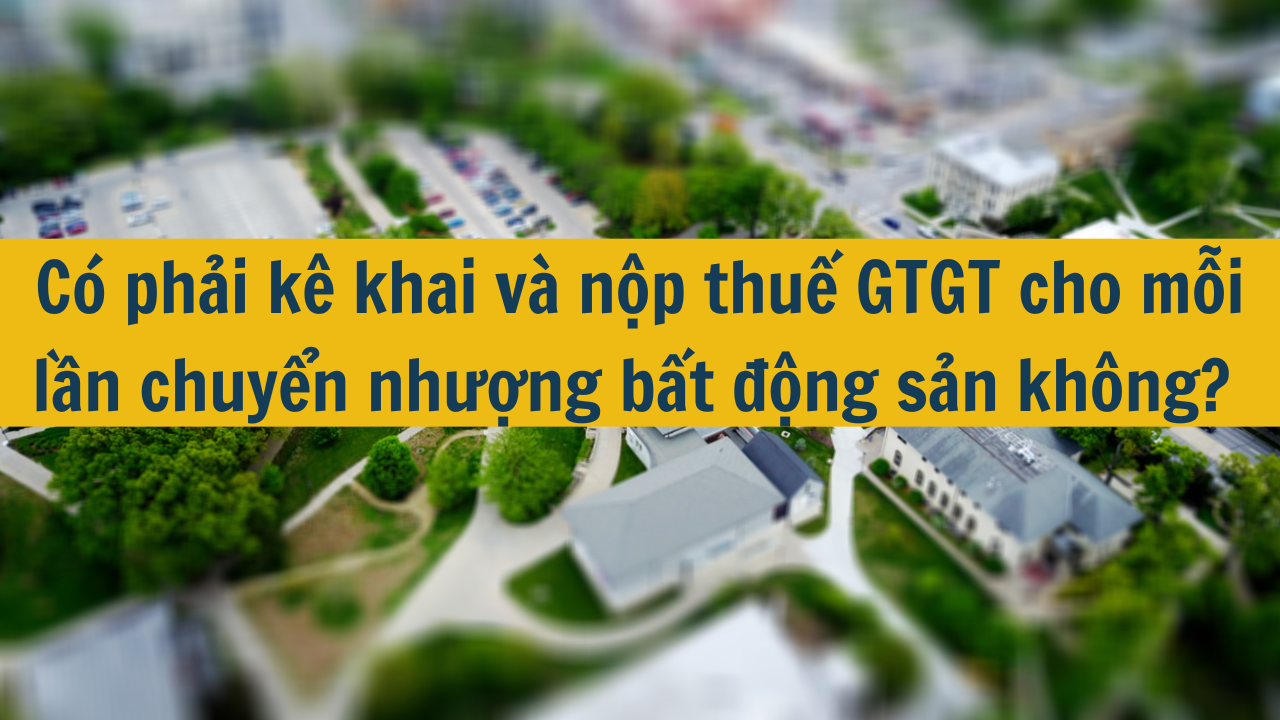
Có phải kê khai và nộp thuế GTGT cho mỗi lần chuyển nhượng bất động sản không?
Trong các giao dịch chuyển nhượng bất động sản, kê khai và nộp thuế giá trị gia tăng (GTGT) là bước quan trọng mà nhiều người quan tâm. Tuy nhiên, không phải ai cũng biết rõ liệu có cần phải kê khai và nộp thuế GTGT cho từng lần chuyển nhượng hay không, và khi nào giao dịch được miễn thuế. Bài viết này sẽ giúp làm rõ các quy định về thuế GTGT trong chuyển nhượng bất động sản, để bạn thực hiện nghĩa vụ thuế đúng cách và tránh những sai sót không đáng có. 20/11/2024Chuyển quyền sử dụng đất có phải chịu thuế GTGT hay không?
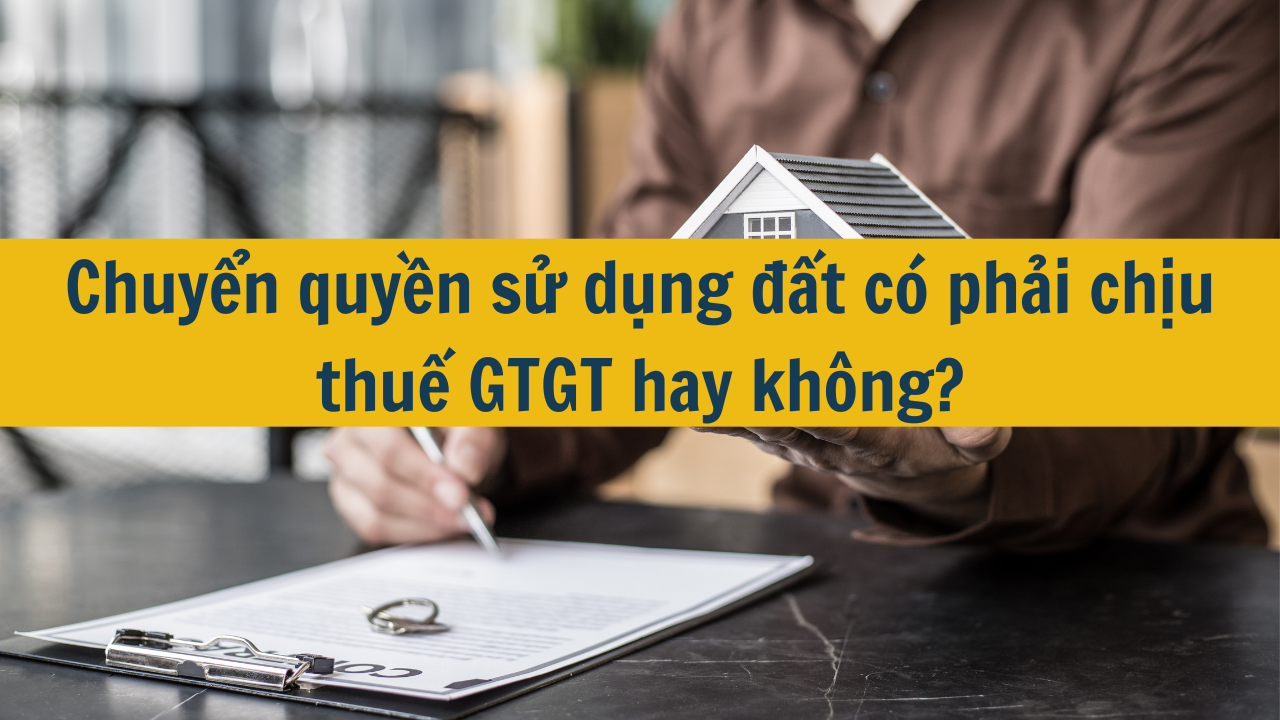
Chuyển quyền sử dụng đất có phải chịu thuế GTGT hay không?
Chuyển quyền sử dụng đất là giao dịch phổ biến trong lĩnh vực bất động sản, nhưng không phải ai cũng rõ liệu giao dịch này có phải chịu thuế giá trị gia tăng (GTGT) hay không. Theo quy định pháp luật, thuế GTGT được áp dụng cho hầu hết các hoạt động kinh doanh hàng hóa, dịch vụ, nhưng với đất đai lại có những ngoại lệ cụ thể. Bài viết này sẽ giúp bạn hiểu rõ quy định về thuế GTGT trong trường hợp chuyển quyền sử dụng đất, để đảm bảo tuân thủ pháp luật và thực hiện giao dịch thuận lợi. 20/11/2024Nếu không có hóa đơn đầu vào, cách tính thuế GTGT trong chuyển nhượng bất động sản như thế nào?

Nếu không có hóa đơn đầu vào, cách tính thuế GTGT trong chuyển nhượng bất động sản như thế nào?
Trong chuyển nhượng bất động sản, hóa đơn đầu vào là cơ sở quan trọng để tính thuế giá trị gia tăng (GTGT) một cách chính xác. Tuy nhiên, không phải lúc nào người bán cũng có sẵn hóa đơn đầu vào cho tài sản chuyển nhượng, điều này gây nhiều băn khoăn về cách tính thuế hợp lý. Bài viết này sẽ hướng dẫn cách tính thuế GTGT trong trường hợp không có hóa đơn đầu vào, giúp bạn tuân thủ đúng quy định và tránh các rủi ro pháp lý khi thực hiện giao dịch bất động sản. 20/11/2024Giá tính thuế GTGT đối với hoạt động chuyển nhượng bất động sản
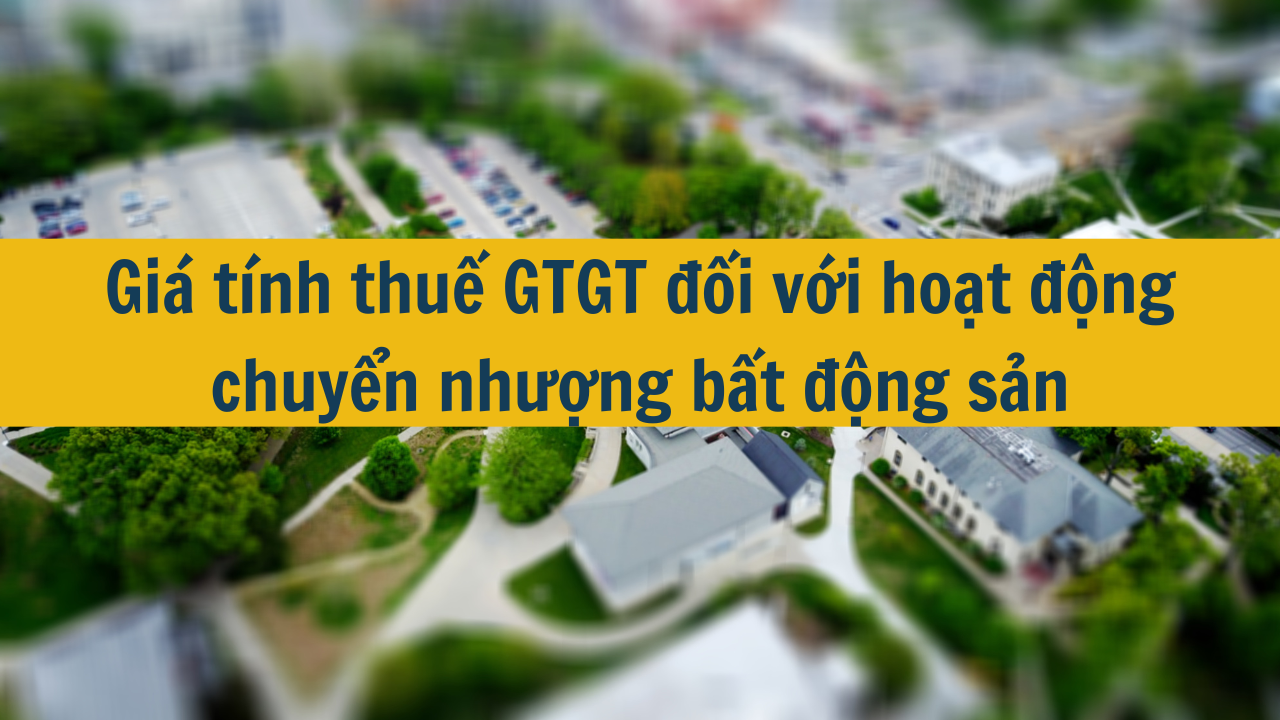
Giá tính thuế GTGT đối với hoạt động chuyển nhượng bất động sản
Giá tính thuế giá trị gia tăng (GTGT) trong hoạt động chuyển nhượng bất động sản là yếu tố quan trọng ảnh hưởng đến số thuế phải nộp. Đối với bất động sản, việc xác định giá tính thuế GTGT không chỉ cần tuân thủ các quy định về thuế, mà còn đảm bảo sự minh bạch trong giao dịch và nghĩa vụ tài chính. Bài viết dưới đây sẽ giúp bạn nắm rõ các quy định hiện hành về cách tính giá tính thuế GTGT khi chuyển nhượng bất động sản, đảm bảo đúng luật và chính xác trong kê khai. 20/11/2024Chuyển nhượng bất động sản có phải chịu thuế GTGT hay không?
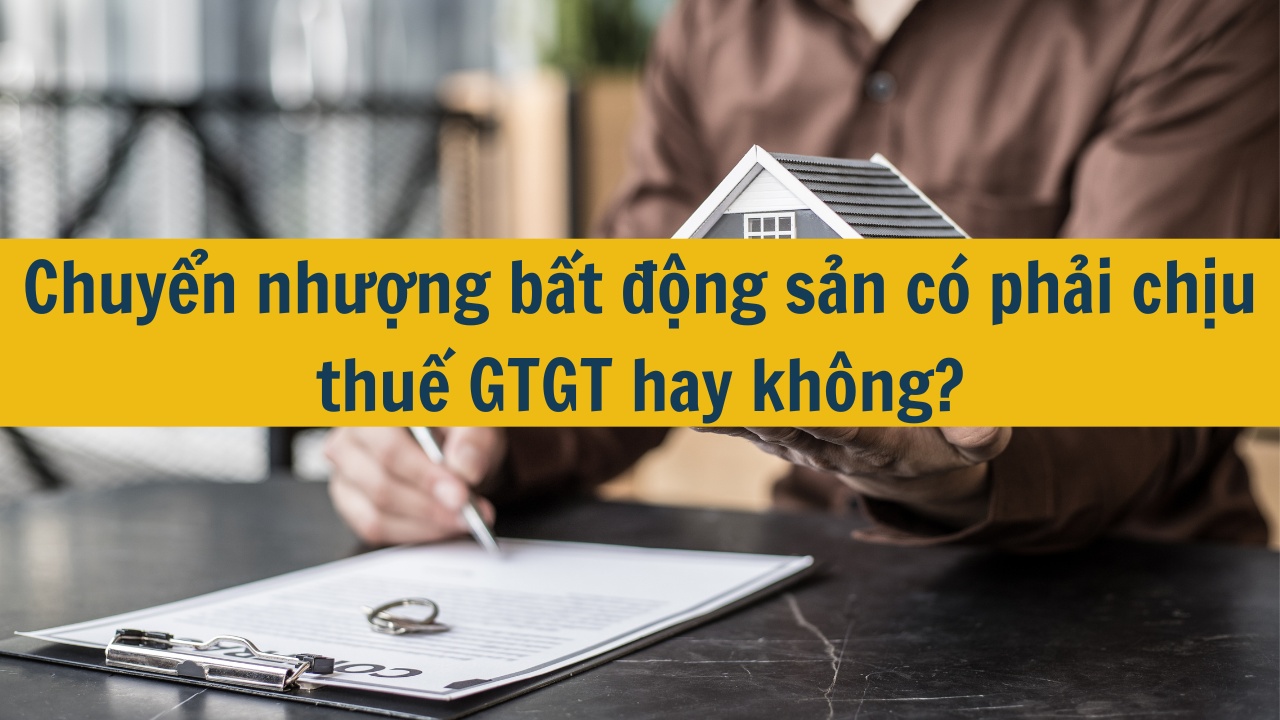
Chuyển nhượng bất động sản có phải chịu thuế GTGT hay không?
Trong các giao dịch mua bán, chuyển nhượng bất động sản, một trong những câu hỏi thường gặp là liệu hoạt động này có phải chịu thuế giá trị gia tăng (GTGT) hay không. Thuế GTGT trong chuyển nhượng bất động sản được áp dụng như thế nào và có những trường hợp nào được miễn thuế? Bài viết dưới đây sẽ giải đáp cụ thể các quy định liên quan, giúp bạn hiểu rõ hơn về nghĩa vụ thuế trong giao dịch bất động sản. 20/11/2024Hướng dẫn tính thuế GTGT trong chuyển nhượng bất động sản
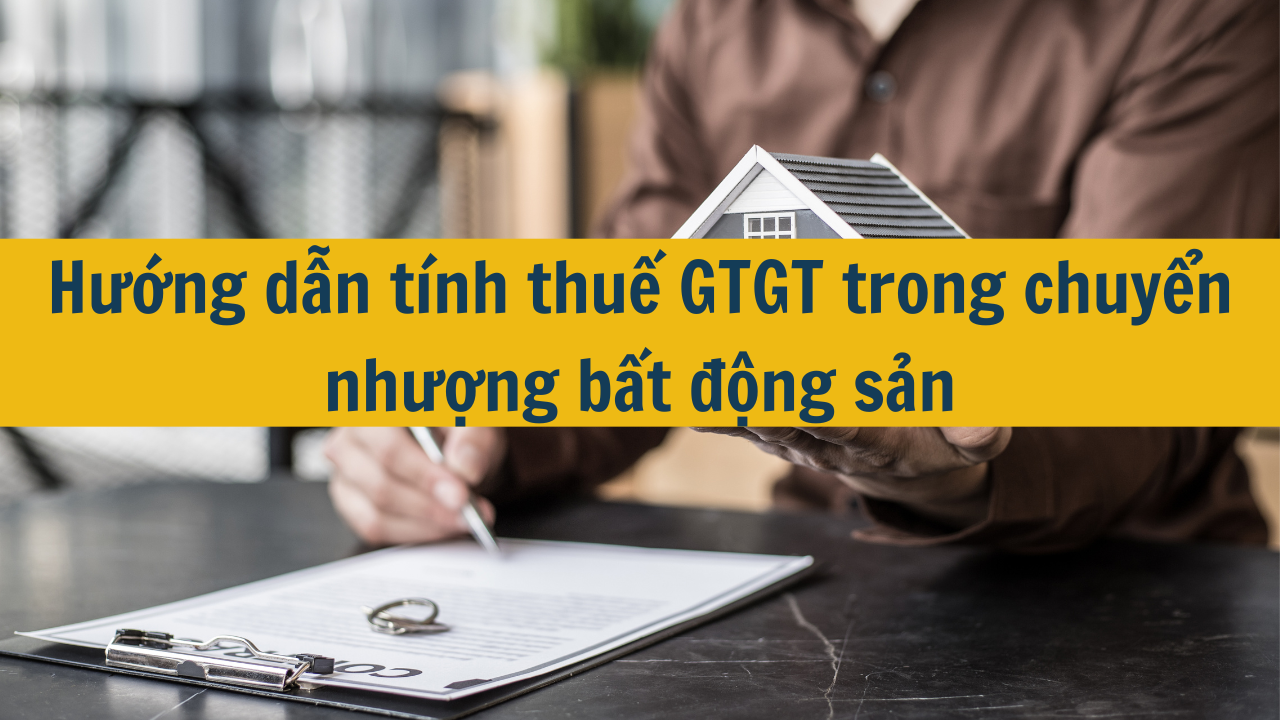
Hướng dẫn tính thuế GTGT trong chuyển nhượng bất động sản
Bạn đang có kế hoạch mua bán nhà đất? Chúc mừng bạn đã đưa ra một quyết định đúng đắn. Tuy nhiên, bên cạnh việc tìm hiểu về giá cả, vị trí, pháp lý, bạn cũng cần quan tâm đến một vấn đề không kém phần quan trọng đó là thuế GTGT. Bài viết này sẽ hướng dẫn bạn cách tính thuế GTGT trong giao dịch chuyển nhượng bất động sản một cách chi tiết và dễ hiểu. 18/11/2024Danh mục hàng hóa, dịch vụ chịu thuế suất 0% thuế GTGT
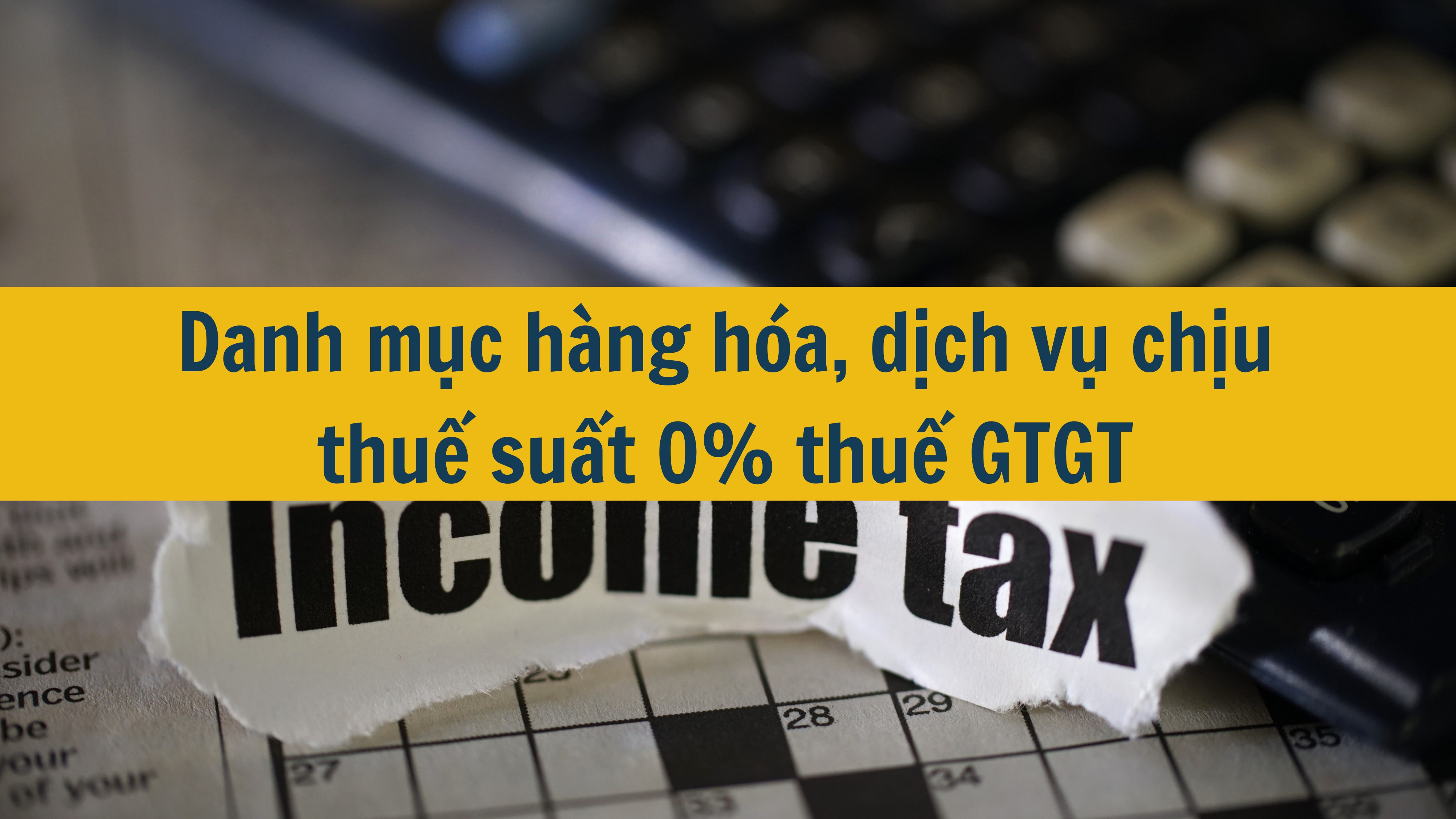
Danh mục hàng hóa, dịch vụ chịu thuế suất 0% thuế GTGT
Thuế giá trị gia tăng (GTGT) là một loại thuế gián thu được áp dụng rộng rãi trong nhiều quốc gia, bao gồm cả Việt Nam. Tuy nhiên, không phải tất cả hàng hóa, dịch vụ đều chịu mức thuế suất như nhau. Có một danh mục các sản phẩm, dịch vụ được áp dụng mức thuế suất 0%. Bài viết này sẽ giúp bạn hiểu rõ hơn về danh mục đặc biệt này. 17/12/2024Bán nhà đất có phải chịu thuế giá trị gia tăng không?

Bán nhà đất có phải chịu thuế giá trị gia tăng không?
Nhà đất là một loại tài sản và được giao dịch trên thị trường rất phổ biến. Vậy câu hỏi được đặt ra là mua bán, chuyển nhượng nhà đất có phải chịu thuế giá trị gia tăng không? Câu trả lời sẽ được chúng tôi giải đáp thông qua bài viết dưới đây. 17/11/2024Thuế GTGT khi sử dụng dịch vụ từ nước ngoài quy định như thế nào?
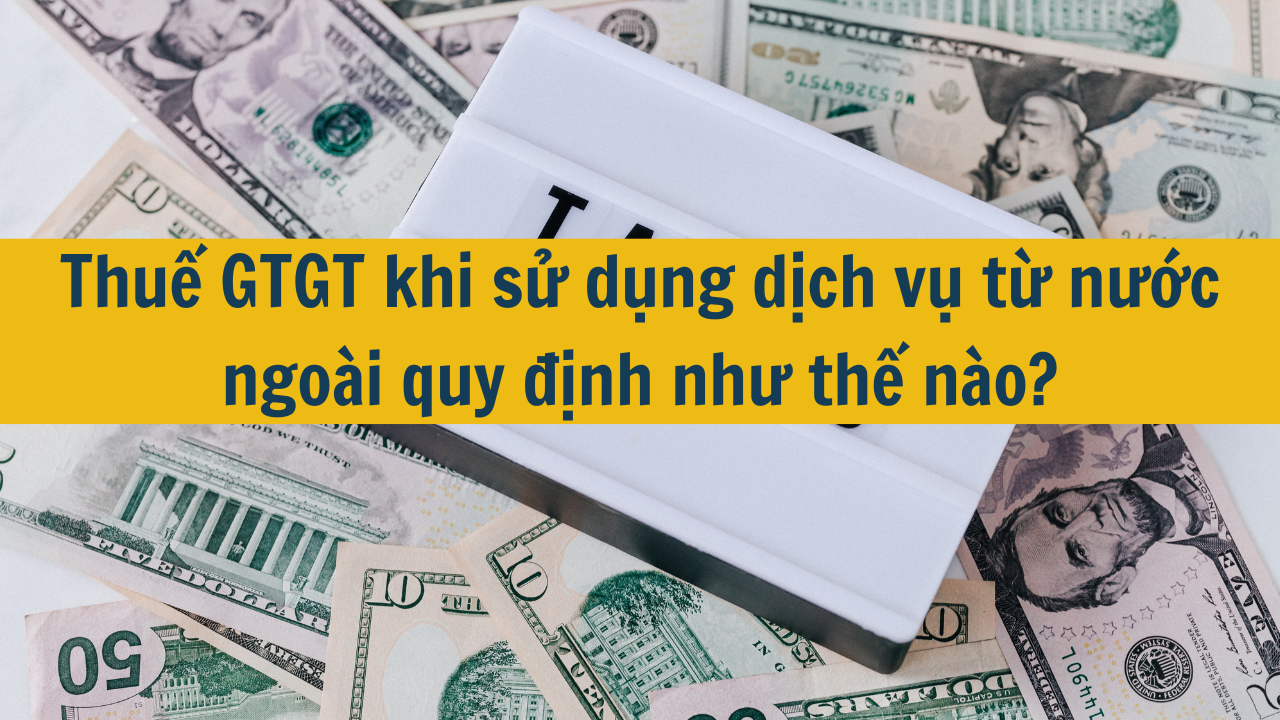

 Nghị định 209/2013/NĐ-CP hướng dẫn Luật thuế giá trị gia tăng (Bản Word)
Nghị định 209/2013/NĐ-CP hướng dẫn Luật thuế giá trị gia tăng (Bản Word)
 Nghị định 209/2013/NĐ-CP hướng dẫn Luật thuế giá trị gia tăng (Bản Pdf)
Nghị định 209/2013/NĐ-CP hướng dẫn Luật thuế giá trị gia tăng (Bản Pdf)